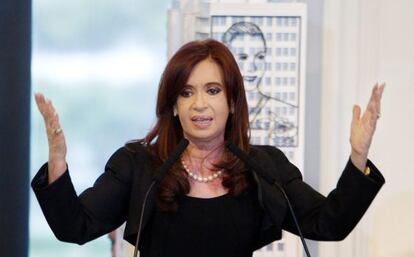Argentina announces expropriation of Repsol oil subsidiary YPF
President Kirchner declares that country’s hydrocarbon industry is a sector of “public interest” YPF’s shares fall 18 percent on New York stock exchange after news breaks

After weeks of speculation, Argentinean President Cristina Fernández de Kirchner announced on Monday that her government is going to nationalize the Spanish Repsol subsidiary YPF, declaring that her country’s hydrocarbon industry was a sector of “public interest.”
In a speech made in Buenos Aires after returning from the Americas Summit in Colombia, Fernández de Kirchner explained that she will send a law to Congress that proposed giving 51 percent control of YPF to the federal government and the remaining 49 percent to the country’s provinces.
In the coming days, the country’s appraisers will decide how much it will reimburse YPF for its shares.
“When one makes decisions in the interests of national management […] one also expects that managers understand the interests of the state,” Fernández de Kirchner said.
“We are the only country in America and one of the few in the world that doesn’t manage its own natural resources, but there were stronger arguments in favor of us taking this decision,” she said.
The nationalization came just days after Spain issued a stern warning against the Argentinean government not to take control of YPF, threatening to break “economic and fraternal” relations if the leftist Peronist administration of Fernández de Kirchner followed through with the plans.
In Madrid, María Dolores de Cospedal, secretary general of the ruling Popular Party (PP), said the government intends “to give an energetic response” after consulting with its European Union partners.
An EU delegation from Brussels was scheduled to arrive in Buenos Aires on Thursday to demand that Argentina respect the agreements it has signed with foreign investors.
“The EU has nothing against Argentina demanding that YPF invest more in the country, but it must be done respecting the commitments both sides adopt in their agreements,” a Brussels source told the Buenos Aires daily Clarín.
For months, YPF has seen cancellations of concessions for oil fields in several provinces, including Chubut, Santa Fe, where the governors of those southern regions accuse YPF of not making investments to up production.
YPF has repeatedly stated that it has made enough investments in the country as outlined in the current Hydrocarbons Law. But Fernández de Kirchner said in her speech that YPF’s investment graph in Argentina looked “like an elephant’s trunk” – a thinly veiled reference to the fallout from King Juan Carlos’ recent hunting expedition in Botswana.
Following the president’s announcement, YPF’s shares dropped 18 percent on the New York stock exchange.
YPF, which was privatized in 1998 under President Carlos Menem’s administration, has also been under the control of the Peterson Group owned by the powerful Eskenazi family of Argentina, which owns 25.46 percent. Repsol controls the remaining 53.47 percent.
The EU delegation said that it was also concerned that Fernández de Kirchner would make nationalization moves against other Spanish companies, such as Endesa’s local Edesur affiliate.
However, Fernández de Kirchner tried to calm overseas investors of other government takeovers by mentioning that her government has helped seek funding for foreign companies operating in Argentina, such as FIAT.
Fresh back from Cartagena, Colombia, where she met with US President Barack Obama and other regional leaders, Fernández de Kirchner has been unsuccessful in winning support for her country’s continued claim to the Falkland Islands. The Argentinean president wanted the regional leaders to include the issue as a clause in the final statement, but no such declaration was drafted.
Tu suscripción se está usando en otro dispositivo
¿Quieres añadir otro usuario a tu suscripción?
Si continúas leyendo en este dispositivo, no se podrá leer en el otro.
FlechaTu suscripción se está usando en otro dispositivo y solo puedes acceder a EL PAÍS desde un dispositivo a la vez.
Si quieres compartir tu cuenta, cambia tu suscripción a la modalidad Premium, así podrás añadir otro usuario. Cada uno accederá con su propia cuenta de email, lo que os permitirá personalizar vuestra experiencia en EL PAÍS.
¿Tienes una suscripción de empresa? Accede aquí para contratar más cuentas.
En el caso de no saber quién está usando tu cuenta, te recomendamos cambiar tu contraseña aquí.
Si decides continuar compartiendo tu cuenta, este mensaje se mostrará en tu dispositivo y en el de la otra persona que está usando tu cuenta de forma indefinida, afectando a tu experiencia de lectura. Puedes consultar aquí los términos y condiciones de la suscripción digital.








































